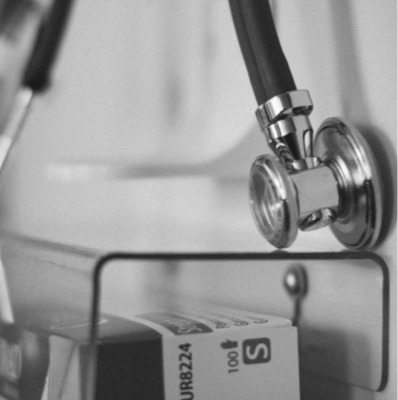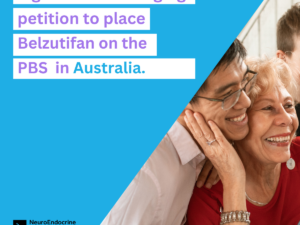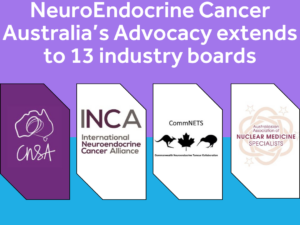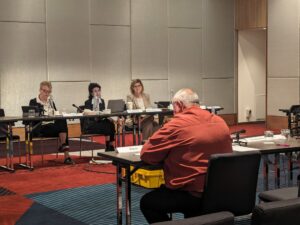(by Meredith Cummins, NSW Project Officer)
 The 16th ENETs Conference for the Diagnosis and Treatment of Neuroendocrine Tumour Disease was a wonderful opportunity to network internationally and gain knowledge and insight into the great work being done in this field. There were so many fabulous sessions, so many that it was difficult to report on them all. The session below was part of the ENETs / European Society of Pathology (ESP) New Classification / Making Sense of High-grade Neoplasms. Within this session Dr Jean – Yves Scoazec from France presented Pulmonary and Digestive High Grade NENs – Where are they similar? The following highlights the grading and a conclusion of the grading. So much work is being done to better define the respective NETs so that treatment can be customized for better management.
The 16th ENETs Conference for the Diagnosis and Treatment of Neuroendocrine Tumour Disease was a wonderful opportunity to network internationally and gain knowledge and insight into the great work being done in this field. There were so many fabulous sessions, so many that it was difficult to report on them all. The session below was part of the ENETs / European Society of Pathology (ESP) New Classification / Making Sense of High-grade Neoplasms. Within this session Dr Jean – Yves Scoazec from France presented Pulmonary and Digestive High Grade NENs – Where are they similar? The following highlights the grading and a conclusion of the grading. So much work is being done to better define the respective NETs so that treatment can be customized for better management.
WHO classification of digestive NENs (2019) is divided into-
- Neuroendocrine tumour G1 – differentiation – well differentiated, mitotic index ,2 mitoses / 2mm2, Ki 67 Index <= 2% (Low Grade)
- Neuroendocrine tumour G2 – differentiation – well differentiated ,mitotic index 2-20 mitoses / 2mm2, Ki 67 Index – 3-20 % (Intermediate Grade)
- Neuroendocrine G3 – differentiation – well differentiated, mitotic index 20 mitoses / 2 mm2, Ki 67 index >20% (High Grade)
- Large Cell neuroendocrine carcinoma – differentiation – poorly differentiated, mitotic index 20 mitoses / 2mm2, Ki 67 index >20% (High to very High Grade)
- Small cell neuroendocrine carcinoma – differentiation – poorly differentiated, mitotic index 20 mitoses / 2mm2, Ki 67 index > 20% (High to very High Grade)
Next WHO classification of Lung NENs (20..)
- Typical Carcinoid – differentiation – well differentiated, necrosis – absent, Mitotic index , 2 mitoses / 10HPF (2mm2)( Low Grade)
- Atypical carcinoid – well differentiated, necrosis – possible, focal, mitotic index – 2-10 mitoses / 10HPF (2mm2) (Intermediate Grade)
- Supracarcinoid – differentiation – well differentiated – (High Grade)
- Large Cell neuroendocrine carcinoma – differentiation – poorly differentiated, necrosis – frequent, extensive, mitotic index >10mitoses/ 10HPF (2mm2) – (High to very High Grade)
- Small Cell neuroendocrine carcinoma – differentiation – poorly differentiated, necrosis – frequent, extensive, mitotic index > 10 mitoses / 10HPF (2mm2) – (High to very High Grade)
So in conclusion :
- Lung and digestive high grade NENs share some similarities but they also express site specific feature
- High grade NETs exist in both the digestive system and the lung: they require an accurate diagnosis and probably, an adapted treatment
- Small Cell neuroendocrine carcinoma is a distinctive entity
- Large Cell neuroendocrine carcinoma is a diverse category with a need for a reevaluation of our diagnostic and therapeutic approaches




